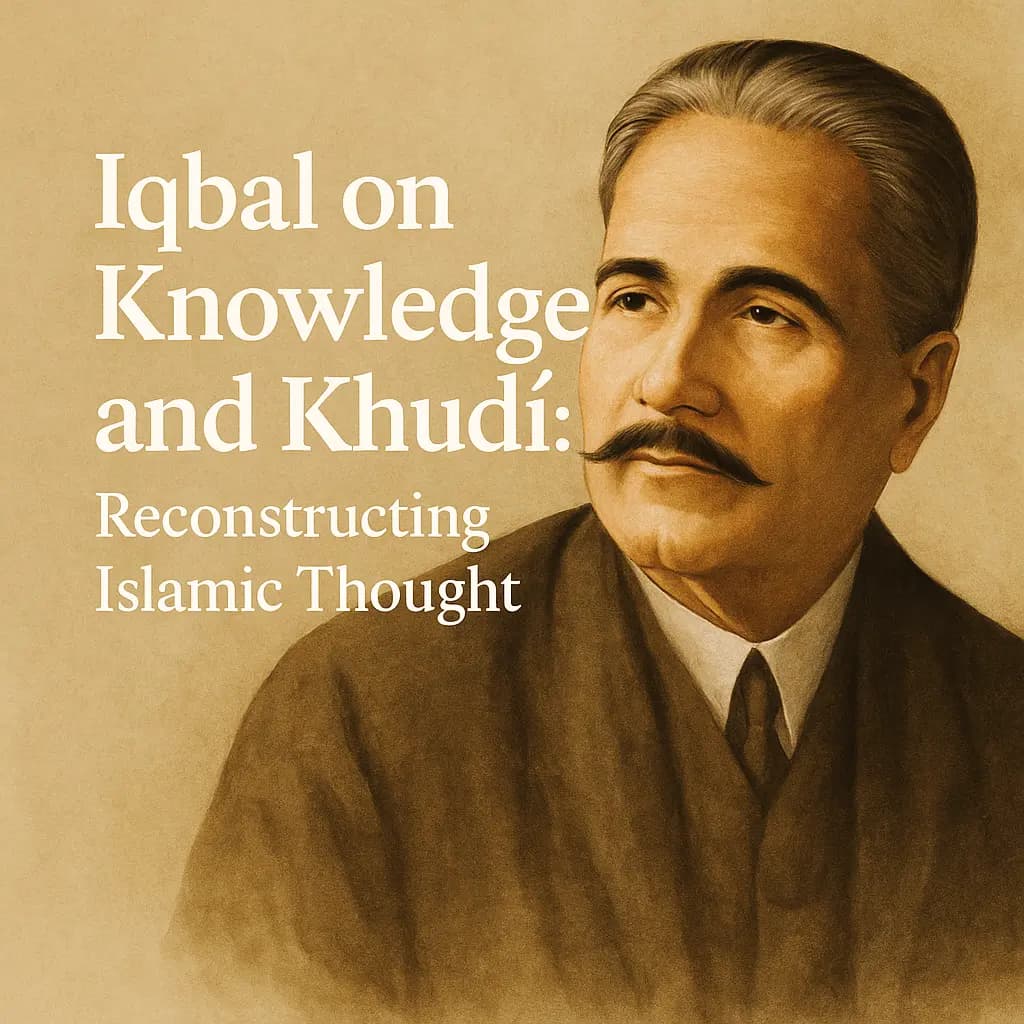Introduction
In The Reconstruction of Religious Thought in Islam (1930–34), Muḥammad Iqbal (1877–1938) attempted nothing less than a rethinking of Islam in light of modern science, philosophy, and spirituality. At the heart of this project lies his epistemology — his understanding of the sources, scope, and limitations of human knowledge. Iqbal carefully examines the avenues of knowing available to man, critiques the inherited traditions of mysticism and scholastic theology, and offers his own vision of the self (khudī) as the active, creative center of knowledge. In doing so, he both affirms the mystical heritage of Islam and modifies it, especially distancing himself from Ibn al-ʿArabī’s universalism in favor of a more individual-centered metaphysics. For Iqbal, epistemology is inseparable from anthropology: to know is to become, and the path of knowledge culminates in the realization of khudī.
Sources of Knowledge in Iqbal’s Reconstruction
Iqbal explicitly identifies three principal sources of human knowledge, which he grounds in both Qur’ānic language and modern philosophy:
Sense-Perception (Observation)
The world of empirical facts is the first source of knowledge. Sense-data are not illusory but genuine disclosures of reality. Iqbal criticizes mystical traditions that depreciated sense-experience; for him, the Qur’ān itself urges naẓar (observation) of nature as a sign of God.
Reason (ʿAql)
Reason is the faculty that organizes sense-perception into systems and concepts. Iqbal affirms rational thought but critiques its limits: pure intellect, when divorced from life and intuition, becomes abstract and lifeless. He draws on modern philosophy (Kant, Bergson) to show both the power and the finitude of reason.
Intuition (Dhawq, Kashf, or Heart-Knowledge)
For Iqbal, the heart (qalb) is not sentimentality but an organ of cognition. Religious experience is a valid form of knowledge, granting access to dimensions beyond empirical and rational reach. However, unlike some Sufi interpreters, Iqbal insists intuition is not passive absorption into universality, but an active, self-conscious experience that deepens individuality. Together, these sources form an integrated epistemology. Knowledge begins with the senses, is shaped by reason, and culminates in intuition.
Iqbal’s Critique of Akbarian Universalism
While Iqbal deeply admired Ibn al-ʿArabī, he resisted the Akbarian doctrine of waḥdat al-wujūd (“unity of being”) and its universalist tendency to dissolve individuality into the One. For Ibn al-ʿArabī, the human self (insān) is a mirror of divine reality, but in mystical union, the individual consciousness becomes absorbed into universality. Iqbal saw this as a problem: It weakens human agency by treating individuality as something to be effaced. It undermines the ethical and creative role of man in history. It risks turning epistemology into a quietism, where knowing is merely unveiling rather than constructive engagement. In place of mystical absorption, Iqbal emphasizes the affirmation of individuality. For him, the task of man is not to dissolve but to strengthen the self.
The Theory of Khudī
Iqbal’s epistemology is inseparable from his celebrated doctrine of khudī (selfhood): Khudī as Active Selfhood: The self is not a static essence but a dynamic, creative principle. Knowledge emerges through the active engagement of khudī with the world. Knowledge as Self-Realization: To know is not only to represent reality but to participate in it, shaping both the world and the self. Individuality over Universality: Where Ibn al-ʿArabī spoke of the dissolution of the self into universal being, Iqbal spoke of the strengthening of the self into a co-creator with God. Prophetic Model: For Iqbal, the Prophet Muhammad embodies the highest epistemology — not retreat from the world but creative transformation of it through divine guidance. Thus, Iqbal redefines mystical knowledge: not loss of self but intensification of selfhood until it becomes aligned with divine creativity.
Iqbal’s Contribution to Epistemology
Iqbal’s originality lies in several contributions: Integration of Sources: He weaves sense, reason, and intuition into a coherent system, avoiding the rationalism–mysticism binary. Validation of Religious Experience: He asserts religious intuition as a legitimate mode of cognition, not reducible to emotion or illusion. Epistemology as Anthropology: Knowledge is tied to the destiny of man. It is not abstract speculation but the unfolding of khudī. Critique of Mystical Quietism: By rejecting absorption into universality, Iqbal positions individuality and agency at the center of epistemology. Reconstruction for Modernity: He translates Islamic epistemology into conversation with modern philosophy (Kant, Bergson, Whitehead), showing its relevance for contemporary thought.
Conclusion
Iqbal’s Reconstruction marks a turning point in modern Islamic philosophy by grounding epistemology in a dynamic vision of man. He identifies three sources of knowledge — sense-perception, reason, and intuition — and redefines religious experience as an active mode of cognition. Against Ibn al-ʿArabī’s universalism, he asserts the doctrine of khudī, where the self is not to be dissolved but intensified, becoming the locus of divine creativity in history. In this way, Iqbal’s contribution to epistemology is also his contribution to anthropology: knowledge is the path by which the human self realizes its destiny. Far from quietism, his epistemology affirms the ethical and creative role of man — a vision both rooted in the Qur’ān and open to modernity.
